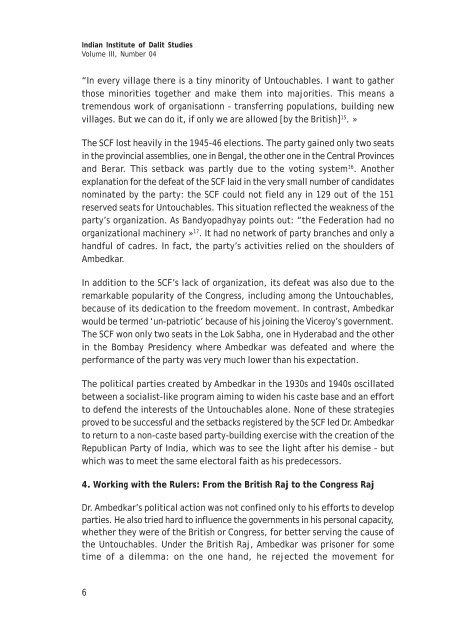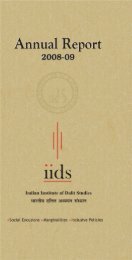Dr. Ambedkar's Strategies Against Untouchability and the Caste
Dr. Ambedkar's Strategies Against Untouchability and the Caste
Dr. Ambedkar's Strategies Against Untouchability and the Caste
You also want an ePaper? Increase the reach of your titles
YUMPU automatically turns print PDFs into web optimized ePapers that Google loves.
Indian Institute of Dalit Studies<br />
Volume III, Number 04<br />
“In every village <strong>the</strong>re is a tiny minority of Untouchables. I want to ga<strong>the</strong>r<br />
those minorities toge<strong>the</strong>r <strong>and</strong> make <strong>the</strong>m into majorities. This means a<br />
tremendous work of organisationn – transferring populations, building new<br />
villages. But we can do it, if only we are allowed [by <strong>the</strong> British] 15 . »<br />
The SCF lost heavily in <strong>the</strong> 1945-46 elections. The party gained only two seats<br />
in <strong>the</strong> provincial assemblies, one in Bengal, <strong>the</strong> o<strong>the</strong>r one in <strong>the</strong> Central Provinces<br />
<strong>and</strong> Berar. This setback was partly due to <strong>the</strong> voting system 16 . Ano<strong>the</strong>r<br />
explanation for <strong>the</strong> defeat of <strong>the</strong> SCF laid in <strong>the</strong> very small number of c<strong>and</strong>idates<br />
nominated by <strong>the</strong> party: <strong>the</strong> SCF could not field any in 129 out of <strong>the</strong> 151<br />
reserved seats for Untouchables. This situation reflected <strong>the</strong> weakness of <strong>the</strong><br />
party’s organization. As B<strong>and</strong>yopadhyay points out: “<strong>the</strong> Federation had no<br />
organizational machinery » 17 . It had no network of party branches <strong>and</strong> only a<br />
h<strong>and</strong>ful of cadres. In fact, <strong>the</strong> party’s activities relied on <strong>the</strong> shoulders of<br />
Ambedkar.<br />
In addition to <strong>the</strong> SCF’s lack of organization, its defeat was also due to <strong>the</strong><br />
remarkable popularity of <strong>the</strong> Congress, including among <strong>the</strong> Untouchables,<br />
because of its dedication to <strong>the</strong> freedom movement. In contrast, Ambedkar<br />
would be termed ‘un-patriotic’ because of his joining <strong>the</strong> Viceroy’s government.<br />
The SCF won only two seats in <strong>the</strong> Lok Sabha, one in Hyderabad <strong>and</strong> <strong>the</strong> o<strong>the</strong>r<br />
in <strong>the</strong> Bombay Presidency where Ambedkar was defeated <strong>and</strong> where <strong>the</strong><br />
performance of <strong>the</strong> party was very much lower than his expectation.<br />
The political parties created by Ambedkar in <strong>the</strong> 1930s <strong>and</strong> 1940s oscillated<br />
between a socialist-like program aiming to widen his caste base <strong>and</strong> an effort<br />
to defend <strong>the</strong> interests of <strong>the</strong> Untouchables alone. None of <strong>the</strong>se strategies<br />
proved to be successful <strong>and</strong> <strong>the</strong> setbacks registered by <strong>the</strong> SCF led <strong>Dr</strong>. Ambedkar<br />
to return to a non-caste based party-building exercise with <strong>the</strong> creation of <strong>the</strong><br />
Republican Party of India, which was to see <strong>the</strong> light after his demise – but<br />
which was to meet <strong>the</strong> same electoral faith as his predecessors.<br />
4. Working with <strong>the</strong> Rulers: From <strong>the</strong> British Raj to <strong>the</strong> Congress Raj<br />
<strong>Dr</strong>. Ambedkar’s political action was not confined only to his efforts to develop<br />
parties. He also tried hard to influence <strong>the</strong> governments in his personal capacity,<br />
whe<strong>the</strong>r <strong>the</strong>y were of <strong>the</strong> British or Congress, for better serving <strong>the</strong> cause of<br />
<strong>the</strong> Untouchables. Under <strong>the</strong> British Raj, Ambedkar was prisoner for some<br />
time of a dilemma: on <strong>the</strong> one h<strong>and</strong>, he rejected <strong>the</strong> movement for<br />
6





